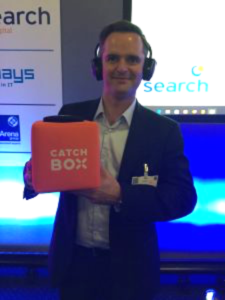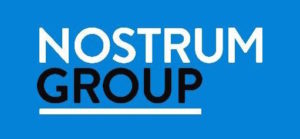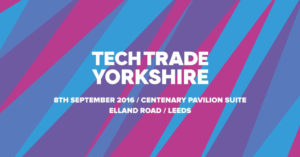On 8th September Whitecap was delighted to play a part in Tech Trade Yorkshire, a one day conference and exhibition targeted at the region’s tech-focused business community.

Tech Trade aims to tackle the opportunities and challenges faced by the Yorkshire tech sector in order to achieve disruption, and is attended by a range of businesses and providers in the technology sector.

It was certainly an event with a difference, with the seminar programme being a ‘silent conference’, whereby every delegate was given a set of headphones via which they could hear the presenter – a novel way to tackle the challenge of background noise at this type of event.
Another issue at conferences is the roaming microphone in Q&A sessions, which Tech Trade handled via a ‘catch box’ mic – a foam cube shaped microphone that can be thrown around the room between delegates.
Our own direct involvement on the day involved chairing a session headlined ‘Bringing innovation into the workplace’. Chaired by Whitecap’s Julian Wells, this session seminar hosted two fascinating and contrasting talks from Sarah Thatchett, joint-founder & managing director of 365Response, and Natasha Sayce-Zelem, head of technology for digital trading at Sky.
Disrupting an established market (365Response)
 Sara Thatchett is managing director of 365Response – she founded the service that uses digital capabilities to offer specialist patient transport service, after an ambulance did not arrive fast enough to a cardiac arrest emergency for her father in law. Sarah was motivated to find a way to make sure that patients could get emergency treatment more efficiently.
Sara Thatchett is managing director of 365Response – she founded the service that uses digital capabilities to offer specialist patient transport service, after an ambulance did not arrive fast enough to a cardiac arrest emergency for her father in law. Sarah was motivated to find a way to make sure that patients could get emergency treatment more efficiently.
Her personal experience gave her the motivation to change something. As a result, 365Response offers a service that is cheaper, faster and more effective than what was previously available. This hasn’t been an easy journey, as it was hard to force through a change that impacted the industry so much, particularly given that it is public sector.
This talk gave an emotive and human perspective on innovation, letting personal motivation be the driver for instigating real change in a technologically slow moving environment with a tough proving ground.
Key takeaways:
Digital is going to have a massive impact on health sector moving forward – ‘the next decade of health will be digital’.
Personal motivation can drive truly disruptive innovation.
 Innovation in an established business (Sky)
Innovation in an established business (Sky)
Natasha Sayce-Zalem, Head of Technology for Digital Trading, Sky, looked at fostering innovation in large established organisations and the challenges behind designing implementing innovative change. She shared her experiences from her background in broadcast media at Sky and the BBC.
In the course of her presentation, Natasha passed on several top tips for successfully implementing innovation:
- Understand and engage with your stakeholders.
- Be as visual as possible.
- Don’t sell people utopia (you will set yourself up to fail).
- Regularly demonstrate progress.
- Listen and analyse feedback.
- Share what you do (don’t keep your work a secret).
Key takeaways:
Innovation is a process not a spark (especially in a large organisation).
People don’t like change, but you need to look beyond their reaction. When you have made a change, you have to listen to the feedback, but also look at the analytics.People may say they hate change, but analytics could show effective and increased usage.
In addition to chairing this innovation session, we also attended some other seminars at Tech Trade, which we have reflected on below:
Modern working – transforming the way you work (Microsoft)

James Akrigg, Head of Technology for partners at Microsoft, gave a seminar focused on how technology enables individuals and organisations to work more efficiently.
James said that technology doesn’t change business; people do… back in 1920 the average company life was 67 years whereas today it is 15 years. Consequently, people will have to achieve more at work and this is where “Modern Working” comes in. James outlined a future where working with a ‘Mixed Reality’ and ‘Virtual Reality’ was combined, in essence using 3D technology in business, healthcare and education to bring people together irrespective of location.
He also added that modern working is about efficiency, giving the example of Microsoft’s latest updates of its software and products and how much it supports your work load. The other example he mentions is emails, he highlighted that emails are not a forward tool. People in his opinion should be able to communicate via instant messaging solutions or conference calls that you can collaborate your work wherever you are.
The Future of Lending (Nostrum Group)
 Richard Carter, Chief Executive of Nostrum Group, a long standing client of Whitecap, spoke on The Future of Lending. Richard discussed the current big players moving into and disrupting the lending market, these included the likes of Paypal, Amazon and Facebook.
Richard Carter, Chief Executive of Nostrum Group, a long standing client of Whitecap, spoke on The Future of Lending. Richard discussed the current big players moving into and disrupting the lending market, these included the likes of Paypal, Amazon and Facebook.
“We think the lending market will change dramatically over the next few years.I predict that in the next couple years we are going to see Facebook offering some kind of credit facility.” – Richard Carter, CE, Nostrum Group.
This is a topic that Nostrum has discussed at length in other FinTech blogs and conference presentations. If it is a topic of interest then there is plenty more material on their website.
 Top tips on cybersecurity (Bob’s Business)
Top tips on cybersecurity (Bob’s Business)
Melanie Oldham is Managing Director at Bob’s Business, a leading cyber security training provider advising on the top cybersecurity tips.
Melanie explained that in essence cyber security can look very technical and most people are not aware when they are in breach of security rules. She noted most security breaches are made by employees, i.e. writing passwords onto posted notes or using the same password over and over again are simple advises that everyone should remember.
Key takeaways:
Don’t blindly trust and don’t be afraid to question.
Don’t isolate the knowledge.
B2B e-commerce: the next game changer (Statement)
Dan Conboy, managing director at digital and e-commerce agency Statement, explained why B2B buying is changing, citing a prediction from Forrester that one million B2B salespeople will find themselves out of a job.
This change is being driven by technology, including smartphones. For example via Amazon a business can now set up a buying account, centralised procurement processes, and can perform regular tasks such as topping up office supplies.
Key takeaways:
Manage your existing relationships – if you previously relied on distributor relationships, it might be time to consider going straight to the end customer.
System integration – make sure your e-commerce, ERP, and legacy systems are configured as effectively as possible.
Strategy – going straight to B2B buyers means a new approach, have you established the required digital marketing capability?
People – make sure you have resources that understand digital and e-commerce.
